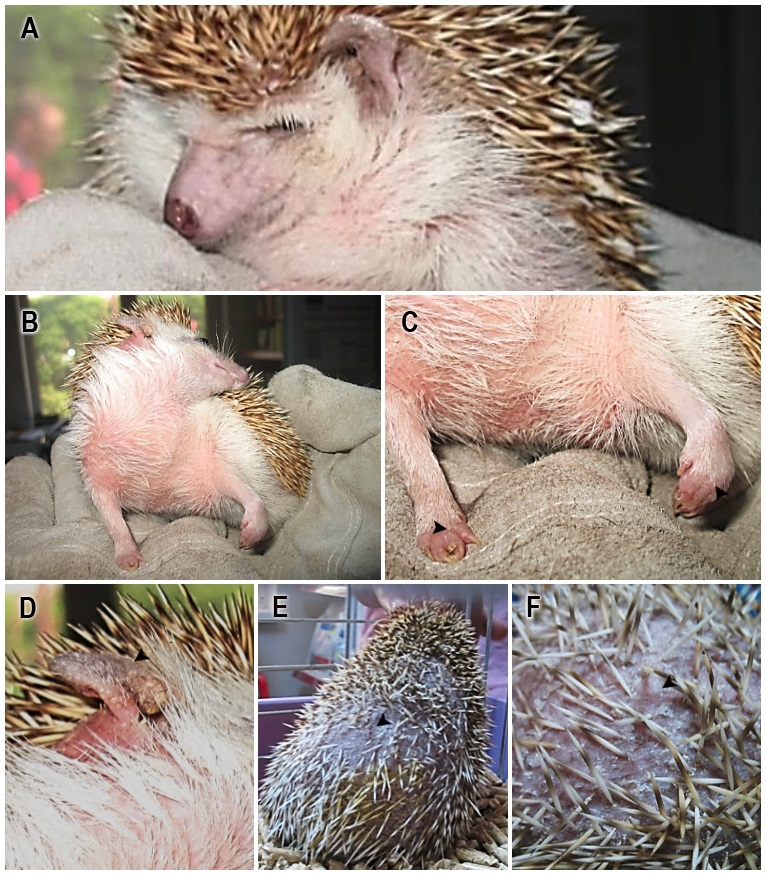The African pygmy hedgehog, also known as hedgehog, is the variety of this species that has gained popularity in recent years as a pet, due to its small size and attractive appearance, these small mammals have nocturnal habits and are able to travel great distances from their small size, every day, so they must have space to exercise.
Although it is relatively easy to care for these animals, they are very vulnerable to diseases like the rest of the animals, so Animal Expert wrote this article about the most common diseases of African pygmy hedgehog.
- Skin problems are very common in hedgehogs.
- There may be fall of some spines.
- Flaking.
- Red areas and scabs in the ears and hardening of the skin in this area.
The causes are several, from the presence of parasites on the skin to nutritional problems, to combat this situation it is necessary to go to the veterinarian and find out what is the origin of the problem, may recommend an oral treatment or even moisturize the affected.areas with natural oils or ointments.
As with cats and dogs, hedgehog harbors in its skin several ticks, mites and fungi, which as we know, ticks feed on animal blood and can cause anemia in your pygmy hedgehog, in addition to being able to transmit other diseases to the animal.
Mites can cause scabies, causing the spines to fall, itching and black spots on the skin; In addition, they make nests in furniture and cushions, infecting the whole house; mushrooms can be dangerous if the hedgehog is sick and weak and spreads easily.
The veterinarian will tell you which topical or other treatments you think are most suitable, to stop these annoying invaders, as well as the steps to be taken to clean your house, it is recommended to clean the cage, canteens, beds and hedgehog toys.
These are the most common gastrointestinal problems of this small mammal, diarrhoea is usually caused by a sudden change in diet or lack of water, while constipation is usually caused by stress and can be fatal in young hedgehogs if not detected early.
If you notice a change in the defecation of your hedgehog, you should consult a specialist promptly, never abruptly change the food of your hedgehog, it should be used from an early age to a varied diet and you have to change the water every day.that make you nervous, such as manipulating it too much or exposing it to loud noises It is very important to always have the basic care that allows your pet to live happy and healthy!
The African pygmy hedgehog tends to gain weight quickly if it is supercharged and does not exercise every day, since in nature these small animals travel long distances to feed, this excess weight can cause liver lipidosis and skin problems, since moisture becomes trapped in your body.Folds.
It is recommended to monitor the portions of your meal and let you walk daily in the garden under your supervision, or go out with it to the park.A hamster wheel, adapted to its size, can be a good choice for the time you’re away.
At the other end, we have anorexia, which is also common in hedgehogs, characterized by food rejection, having several possible causes such as mouth pain, digestive problems and liver lipidosis.Finding the cause of anorexia is critical to knowing how to treat it, but it is necessary to act quickly for the animal to re-eat, and forced feeding may be necessary.
Colds, pneumonia and rhinitis are some of the diseases of the respiratory system that most often attack the African pygmy hedgehog, may appear snot, chills, loss of appetite and consequently weight, sneezing, among others, if the hedgehog has these symptoms should be examined by a veterinarian to rule out a simple cold and confirm that it is not something more serious , like pneumonia.
The factors that trigger respiratory diseases are usually too low temperatures, being the hedgehog very sensitive, a very dusty and dirty environment (which can also cause conjunctivitis) and even nutritional deficiencies, since the mammalian’s defenses weaken, making it vulnerable to the virus.
Occasionally, during garden walks, the hedgehog ingests slugs and becomes infected with pulmonary parasites, which can cause coughing, dyspnoea and possibly death if it does not act in time.
The dental health of the hedgehog is essential, not only to avoid the discomfort of the animal, but also because dental problems can lead to other problems, such as anorexia and its consequences.
A healthy mouth results in a pink gum and white teeth, any other shade is a sign of a possible problem.Periodontitis is the most common disease, which can cause teeth to fall out.
The best way to avoid such problems is to take care of the feeding of your hedgehog, an ideal diet, which preserves the good condition of your teeth and the overall health of your pet, should be varied, including raw and soft foods with dry food.therefore, make sure there is no residue between your teeth and consult your veterinarian to check a tooth brushing routine if deemed necessary.
This article is for informational purposes only, in Animal Expert.com.br we cannot prescribe veterinary treatments or make any type of diagnosis, we suggest taking your pet to the veterinarian in case of any type of condition or discomfort.
If you would like to read articles similar to African Pygmy Hedgehog: Most Common Diseases, we recommend that you visit our Other Health Problems section.

